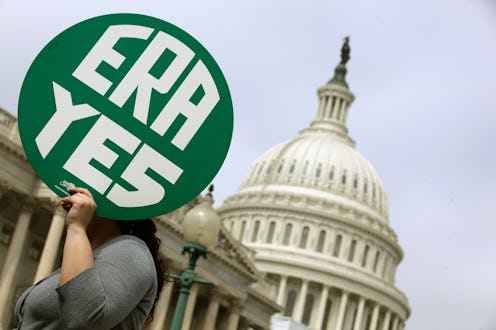News
Women Are One State Away From Finally Being Equal To Men Under The Law

In the 1920s, the National Woman's Party proposed an amendment to the Constitution that would put an end to sex-based discrimination under the law. Nearly a century later, the Equal Rights Amendment still isn't enshrined in the Constitution — but it could be soon, thanks to the Illinois Legislature. In fact, the Equal Rights Amendment is one state away from being ratified.
Both the House of Representatives and the Senate approved the ERA in the early 1970s, and sent it to the states for ratification. It initially seemed as though ratification would be a smooth process, with 35 states signing off on the amendment. However, conservative backlash stalled the ERA, preventing it from being ratified by the necessary 38 states.
After many attempts to revive the ERA, Nevada's legislature voted in the amendment's favor last year. It was followed by Illinois' legislature, whose lawmakers approved the ERA just two weeks ago. Now, the amendment is just one state away from obtaining the 38-state minimum, which — according to the Los Angeles Times — could mean that the ERA may soon become law, even though the deadline to ratify it expired in 1982.
The official website for the ERA indicates that "no amendment before the 20th century had a time limit attached to it." The first amendment to have a ratification deadline was the 18th Amendment — the Prohibition amendment — and the ERA website argues that this time limit was imposed for political reasons. Consequently, the website suggests that the ERA could therefore still be ratified long after the 1982 deadline, because ratification deadlines are not required by the Constitution.
After the Illinois Legislature voted in favor of the ERA, CNN attributed to the renewed interest in the amendment to the rise of the #MeToo and #TimesUp movements, as well as the Women's March. As Bettina Hager, the D.C. director of the ERA Coalition, told Mother Jones earlier this year, these movements have strengthened an "energy that's been there," prompting more people to fight for women's rights.
The ERA only contains 24 words: "Equality of rights under the law shall not be denied or abridged by the United States or by any State on account of sex." Nonetheless, it has managed to spark significant controversy over the past several decades. Even now, as feminists call on the remaining states to ratify the ERA, conservative opponents of the amendment are arguing that it is unnecessary. Moreover, according to CNN, ERA opponents believe that ratifying the amendment would result in the elimination of abortion restrictions.
However, the amendment's proponents — such as Democratic Congresswoman Carolyn Maloney, the House sponsor of the ERA — believe that it is well past time for the ERA to be ratified. Maloney recently told Glamour that she and others who are fighting for the ERA's ratification intend to make the most of the energy that recent women's rights movements have created:
Women are half the population and yet the only right we are guaranteed in the Constitution is the right to vote. By finally ratifying the Equal Rights Amendment we will change that and usher in a new chapter in this nation where equal will truly mean equal for everyone. The ERA is the legal bedrock from which we can fight for and win equal pay for equal work, end sexual harassment and assault, and end gender discrimination. We have an unprecedented opportunity to harness the energy of the Me Too and Time’s Up movements, of the race to the polls and record number of women running for office, to create lasting change for generations to come. We must seize it.
If one more state legislature signs off on the ERA — thereby meeting the 38-state minimum — the LA Times reported that it could potentially go to the courts due to the 1982 deadline, but the amendment is nonetheless inching closer to officially enshrining equality for men and women in the Constitution.